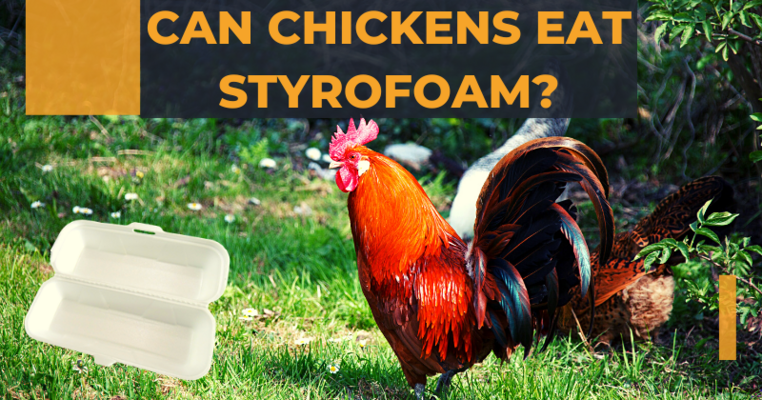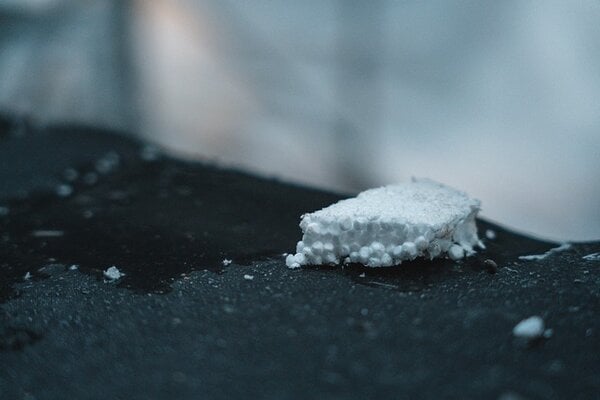The reason chickens love Styrofoam remains a mystery. It lacks nutritional value and, in my own opinion, does not smell appealing. In spite of this, any backyard chicken owner will tell you that their chickens pecked the Styrofoam packing to pieces if they left it out.
It is easy to imagine chickens pecking at something just to see what happens. It makes sense that they continue pecking away once they see little bits falling off.
Chickens may eat or try to eat many things they shouldn't.

In general, insulation and packaging materials made of foam, plastic, or other materials should be avoided. There are no significant risks associated with Styrofoam being hazardous, poisonous, toxic, or dangerous. So if your chickens have eaten some, don't panic.
The main problem is that the chickens' crop or intestines could be blocked. The likelihood of this blockage happening is low, however. In most cases, it will pass through their system because it breaks up into small white balls, unless of course if they've eaten a large amount of it.

If a chicken appears under the weather or seems to have a blocked crop caused by overeating packaging, look for the following signs:
Lethargic Behavior - It will be obvious to you when your chickens are acting lethargic since you know them best. A chicken acting strangely usually means they're feeling unwell.
Loss of Appetite - Any animal that isn't eating is a sign that something is amiss. There is no doubt that chickens enjoy grazing throughout the day, and they will even eat plastic, polystyrene & all sorts of other things.
Pale Wattle/Comb - In many cases, a pale wattle or comb indicates an ill chicken. A dull or pale pinkish color is definitely a sign that something is wrong.
A Pause in Egg Production - In most cases, blocked crops or intestinal problems will cause egg production to be paused. Give your hen a checkup if you don't see eggs in her nesting box as often as you used to.
The first thing you should do if you notice any of the above - or anything else that is not normal in your chicken's behavior - is to take your chicken to an avian veterinarian & explain that your hen might have eaten a bit too much styrofoam.
Fortunately, you don't have to worry much. Seeing the little white balls floating around your yard and being annoyed by the damage to your foam insulation board is more likely to irritate you than handling a sick chicken. Still, you shouldn't let them eat Styrofoam though.
Rather supplement their diet with some favorite treats such as mealworms, berries, corn, broccoli, kale, carrots, celery, and other healthy kitchen scraps which are a great source of vitamins, calcium, protein, and other minerals.
Remember to feed them these in moderation as a diet containing a large quantity of treats could lead to other problems. As a general rule of thumb treats should constitute 10% of their diet and 90% of commercial feed.
So whether you choose to use spray foam insulation, Styrofoam or fiberglass insulation to insulate their coop, make sure you cover it up to avoid tempting them.
It is easy to imagine chickens pecking at something just to see what happens. It makes sense that they continue pecking away once they see little bits falling off.
Chickens may eat or try to eat many things they shouldn't.
Can Styrofoam harm chickens?
In general, insulation and packaging materials made of foam, plastic, or other materials should be avoided. There are no significant risks associated with Styrofoam being hazardous, poisonous, toxic, or dangerous. So if your chickens have eaten some, don't panic.
The main problem is that the chickens' crop or intestines could be blocked. The likelihood of this blockage happening is low, however. In most cases, it will pass through their system because it breaks up into small white balls, unless of course if they've eaten a large amount of it.
Things Chickens Shouldn't Eat But Are Attracted To
Besides Styrofoam, chickens seem to have a fascination with other "non-food" items. Your yard may also contain the following materials which aren't safe:- Caulk - It's the white substance decorators use to seal cracks and gaps.
- Staples/Nails - They also like shiny objects. The most common ones are staples, screws, nails, etc. The dangers associated with these are obvious.
- Loose Threads - There are times when chickens are as bad as playful kittens when it comes to loose threads. They will probably pick up dangling cords, strings, or threads, unravel whatever it was attached to, and run off with them.
- Peeling Paint - Another undesirable habit that can make the chicken coop look tatty very quickly is peeling paint which in itself contains a host of chemicals. Hens will peck at paint or any other material that is peeling or coming off if they see it!
Watch out for sick chickens
Styrofoam poses no significant threat to your chickens' health, as I mentioned earlier. It is still recommended to avoid letting them consume any styrofoam products and watch out for signs of sickness if they just consumed a float, egg carton, coffee cup, packing, or anything else made of it.If a chicken appears under the weather or seems to have a blocked crop caused by overeating packaging, look for the following signs:
Lethargic Behavior - It will be obvious to you when your chickens are acting lethargic since you know them best. A chicken acting strangely usually means they're feeling unwell.
Loss of Appetite - Any animal that isn't eating is a sign that something is amiss. There is no doubt that chickens enjoy grazing throughout the day, and they will even eat plastic, polystyrene & all sorts of other things.
Pale Wattle/Comb - In many cases, a pale wattle or comb indicates an ill chicken. A dull or pale pinkish color is definitely a sign that something is wrong.
A Pause in Egg Production - In most cases, blocked crops or intestinal problems will cause egg production to be paused. Give your hen a checkup if you don't see eggs in her nesting box as often as you used to.
The first thing you should do if you notice any of the above - or anything else that is not normal in your chicken's behavior - is to take your chicken to an avian veterinarian & explain that your hen might have eaten a bit too much styrofoam.
Conclusion
Chickens provide good egg production, are fun and rewarding to have around... and are sometimes a little silly. We're not sure why they eat Styrofoam, but it's one of those strange things we can't quite explain.Fortunately, you don't have to worry much. Seeing the little white balls floating around your yard and being annoyed by the damage to your foam insulation board is more likely to irritate you than handling a sick chicken. Still, you shouldn't let them eat Styrofoam though.
Rather supplement their diet with some favorite treats such as mealworms, berries, corn, broccoli, kale, carrots, celery, and other healthy kitchen scraps which are a great source of vitamins, calcium, protein, and other minerals.
Remember to feed them these in moderation as a diet containing a large quantity of treats could lead to other problems. As a general rule of thumb treats should constitute 10% of their diet and 90% of commercial feed.
So whether you choose to use spray foam insulation, Styrofoam or fiberglass insulation to insulate their coop, make sure you cover it up to avoid tempting them.



